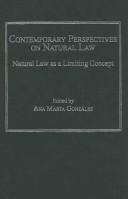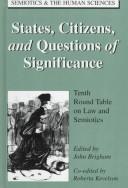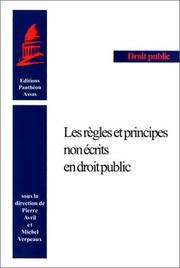| Listing 1 - 10 of 350 | << page >> |
Sort by
|
Book
ISBN: 8814013969 9788814013966 Year: 1988 Volume: 22 Publisher: Milan : Giuffrè Editore,
Abstract | Keywords | Export | Availability | Bookmark
 Loading...
Loading...Choose an application
- Reference Manager
- EndNote
- RefWorks (Direct export to RefWorks)
Book
ISBN: 2842871979 9782842871970 Year: 2001 Volume: 6 Publisher: Limoges PULIM
Abstract | Keywords | Export | Availability | Bookmark
 Loading...
Loading...Choose an application
- Reference Manager
- EndNote
- RefWorks (Direct export to RefWorks)

ISBN: 1317160592 1281332771 9786611332778 075469299X 9780754692997 9780754660545 0754660540 9781317160595 9781281332776 6611332774 9781315573915 9781317160588 9781138251458 1315573911 1317160606 Year: 2008 Publisher: Aldershot, Hants, England ; Burlington, VT : Ashgate,
Abstract | Keywords | Export | Availability | Bookmark
 Loading...
Loading...Choose an application
- Reference Manager
- EndNote
- RefWorks (Direct export to RefWorks)
This book is a major contribution to the renewed interest in natural law. It provides the reader with a comprehensive overview of natural law, both from a historical and a systematic point of view. It ranges from the mediaeval synthesis of Aquinas through the early modern elaborations of natural law, up to current discussions on the very possibility and practical relevance of natural law theory for the contemporary mind.
Book
ISBN: 9789067043113 9067043117 Year: 2010 Publisher: The Hague T.M.C. Asser Press
Abstract | Keywords | Export | Availability | Bookmark
 Loading...
Loading...Choose an application
- Reference Manager
- EndNote
- RefWorks (Direct export to RefWorks)

ISBN: 082043020X 9780820430201 Year: 1997 Volume: 11 Publisher: New York (N.Y.): Lang
Abstract | Keywords | Export | Availability | Bookmark
 Loading...
Loading...Choose an application
- Reference Manager
- EndNote
- RefWorks (Direct export to RefWorks)
Semiotics (Law) --- Congresses --- -Law --- -Congresses --- Law --- Semiotics (Law) - Congresses
Book
ISBN: 9780198791409 0198791402 Year: 2016 Publisher: Oxford Oxford University Press
Abstract | Keywords | Export | Availability | Bookmark
 Loading...
Loading...Choose an application
- Reference Manager
- EndNote
- RefWorks (Direct export to RefWorks)
Soft law increasingly shapes and impacts the content of international law in multiple ways, from being a first step in a norm-making process to providing detailed rules and technical standards required for the interpretation and the implementation of treaties. This is especially true in the area of human rights. While relatively few human rights treaties have been adopted at the UN level in the last two decades, the number of declarations, resolutions, conclusions, and principles has grown significantly. In some areas, soft law has come to fill a void in the absence of treaty law, exerting a degree of normative force exceeding its non-binding character. In others areas, soft law has become a battleground for interpretative struggles to expand and limit human rights protection in the context of existing regimes.Despite these developments, little attention has been paid to soft law within human rights legal scholarship. Building on a thorough analysis of relevant case studies, this volume systematically explores the roles of soft law in both established and emerging human rights regimes. The book argues that a better understanding of how soft law shapes and affects different branches of international human rights law not only provides a more dynamic picture of the current state of international human rights, but also helps to unsettle and critically question certain political and doctrinal beliefs. Following introductory chapters that lay out the general conceptual framework, the book is divided in two parts. The first part focuses on cases that examine the role of soft law within human rights regimes where there are established hard law standards, its progressive and regressive effects, and the role that different actors play in the incubation process. The second part focuses on the role of soft law in emerging areas of international law where there is no substantial treaty codification of norms. These chapters examine the relationship between soft and hard law, the role of different actors in formulating new soft law, and the potential for eventual codification.
Human rights --- Soft law --- Human rights - Congresses --- Soft law - Congresses

ISBN: 2913397123 9782913397125 Year: 2000 Publisher: Paris : Editions Panthéon-Assas
Abstract | Keywords | Export | Availability | Bookmark
 Loading...
Loading...Choose an application
- Reference Manager
- EndNote
- RefWorks (Direct export to RefWorks)
Constitutional law --- Customary law --- Judge-made law --- Public law --- Rule of law --- Droit public --- Règle de droit --- Public law. --- Public law - Congresses --- Customary law - Congresses --- Judge-made law - Congresses --- Constitutional law - Congresses
Book
ISBN: 9789077596197 9782802723943 9787077596197 2802723944 Year: 2007 Publisher: Louvain-la-Neuve Utrecht Academia-Bruylant Eleven International Publishing
Abstract | Keywords | Export | Availability | Bookmark
 Loading...
Loading...Choose an application
- Reference Manager
- EndNote
- RefWorks (Direct export to RefWorks)
Comparative law --- Droit comparé --- Congresses. --- Congrès --- Comparative law - Congresses
Book
ISBN: 1509957413 1509957391 Year: 2023 Publisher: London : London : Hart Publishing, Bloomsbury Publishing (UK),
Abstract | Keywords | Export | Availability | Bookmark
 Loading...
Loading...Choose an application
- Reference Manager
- EndNote
- RefWorks (Direct export to RefWorks)
This book explores critical issues about how courts engage with questions of fact in public law adjudication. Although the topic of judicial review - the mechanism through which individuals can challenge governmental action - continues to generate sustained interest amongst constitutional and administrative lawyers, there has been little attention given to questions of fact. This is so despite such determinations of fact often being hugely important to the outcomes and impacts of public law adjudication. The book brings together scholars from across the common law world to identify and explore contested issues, common challenges, and gaps in understanding. The various chapters consider where facts arise in constitutional and administrative law proceedings, the role of the courts, and the types of evidence that might assist courts in determining legal issues that are underpinned by complex and contested social or policy questions. The book also considers whether the existing laws and practices surrounding evidence are sufficient, and how other disciplines might assist the courts. The book reconnects the key practical issues surrounding evidence and facts with the lively academic debate on judicial review in the common law world; it therefore contributes to an emerging area of scholarly debate and also has practical implications for the conduct of litigation and government policy-making.
Common law --- Administrative law Congresses --- Congresses --- Administrative law
Book
ISBN: 9783725585274 372558527X Year: 2016 Volume: 76 Publisher: Zurich : Schulthess,
Abstract | Keywords | Export | Availability | Bookmark
 Loading...
Loading...Choose an application
- Reference Manager
- EndNote
- RefWorks (Direct export to RefWorks)
Legal development may happen slowly, but law never stands still. Among the many factors having an impact on legal development, the influence of foreign and international patterns, although often controversial, is not questionable. But to what extent do foreign and international laws actually affect (the different paths of) legal development? The book aims to provide an answer to this question through different perspectives – from human rights and environmental law to commercial and contract law – and in different geographical contexts – from Europe to Africa, from Asia to Latin America.
Law --- International law --- Comparative law --- Droit comparé --- Droit --- Droit international et droit interne --- Droit européen et droit interne --- Consommation --- Consommateurs --- Méthode comparative --- Sociologie --- Comportement --- Droit comparé. --- Droit européen et droit interne. --- Law - Congresses --- International law - Congresses --- Comparative law - Congresses
| Listing 1 - 10 of 350 | << page >> |
Sort by
|

 Search
Search Feedback
Feedback About UniCat
About UniCat  Help
Help News
News